Abstract
1. The in vivo action of cellulose sulphate was studied in an attempt to clarify the role of complement and kinin formation in inflammation.
2. Inflammatory oedema was produced in the rat paw by heat (45·5° C), and on the ear by xylene. The oedema was assessed by comparing the ratio of fresh wet weight to dry weight of corresponding injured and non-injured parts.
3. Following cellulose sulphate (6·5 mg/kg i.v.), plasma kininogen concentrations were promptly reduced by 90% or more. The reduction in complement titres was statistically significant and ranged from 17 to 65%. No toxic effects were observed. The oedema caused by heat or xylene was not reduced in these rats.
4. Cellulose sulphate (80 mg/kg i.p.) given over 3 days depleted plasma kininogen by about 90%, but reduced complement titres only slightly. These rats gained less weight and their condition was poor. Blood clotting was impaired and widespread haemorrhages were found. Heat and xylene produced significantly less oedema than in control rats. This diminished response is attributed to toxic side effects of cellulose sulphate, rather than depleted plasma kininogen and reduced plasma complement.
5. The results suggest that the inflammatory reactions to thermal and chemical injury can fully develop when plasma kininogen and complement are lowered.
Full text
PDF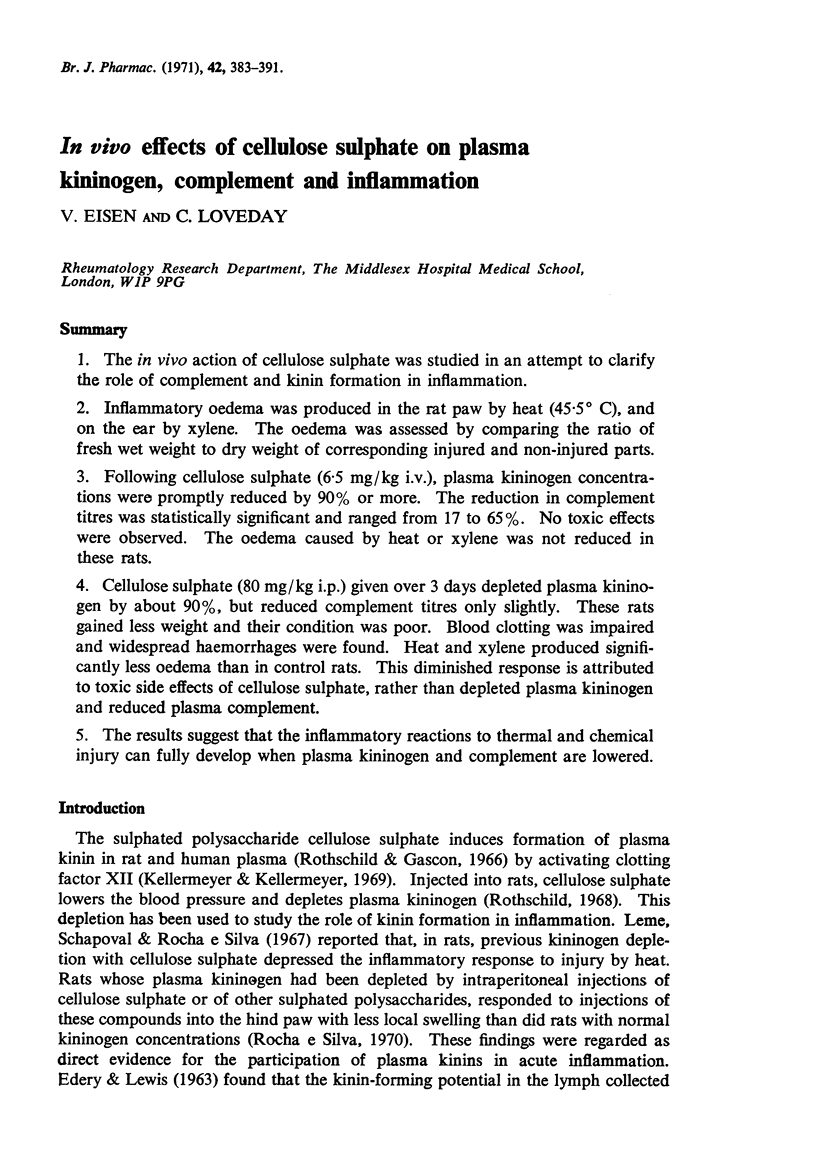
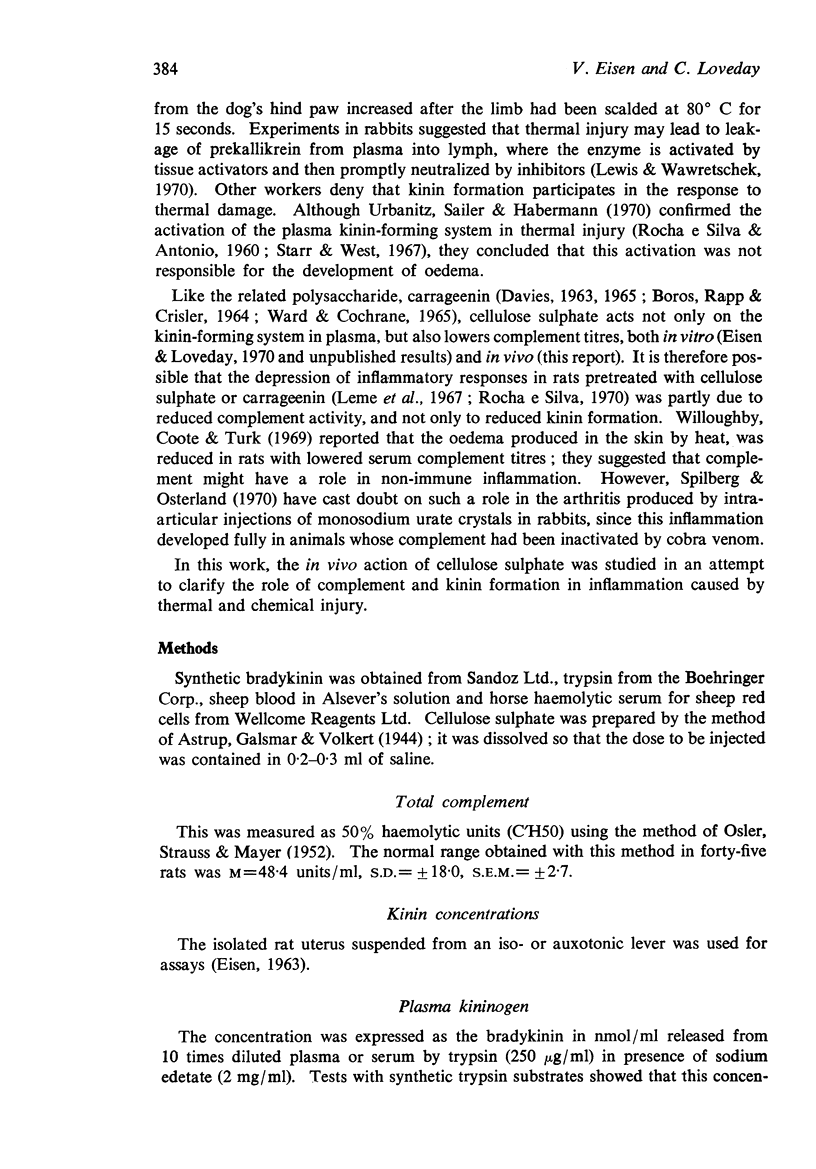
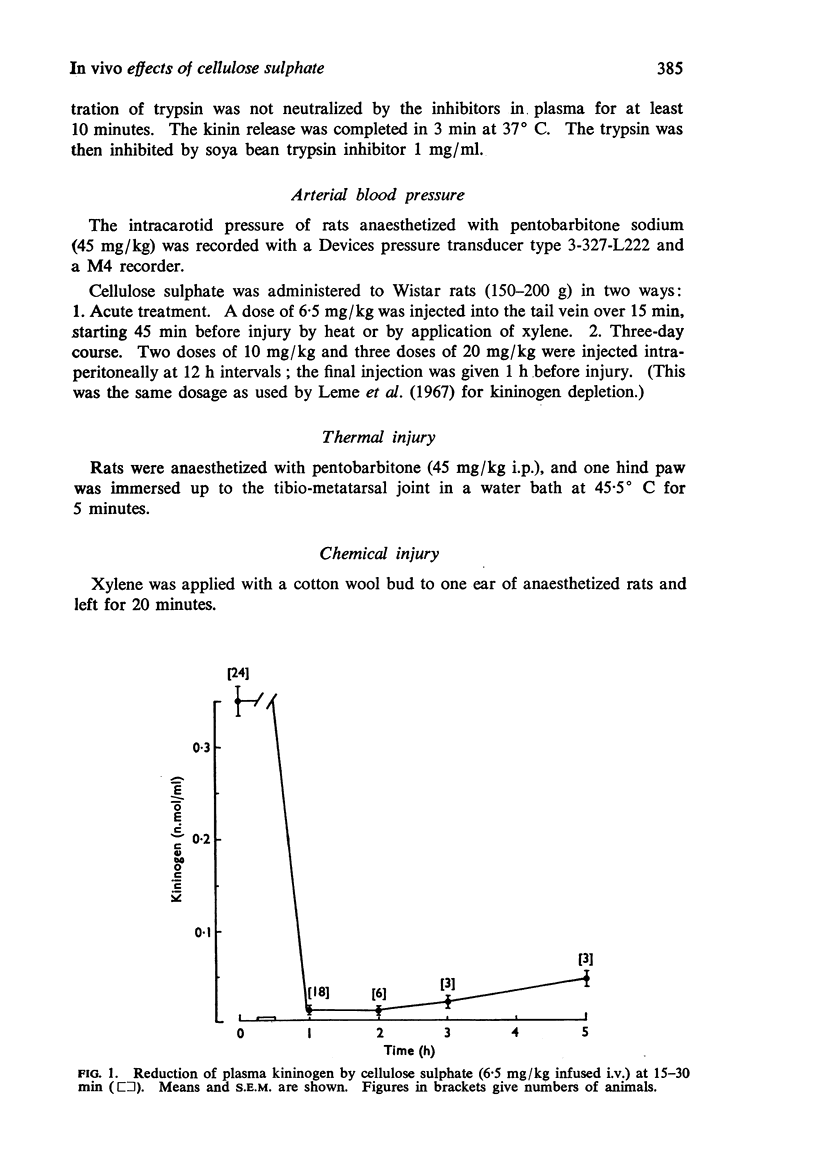
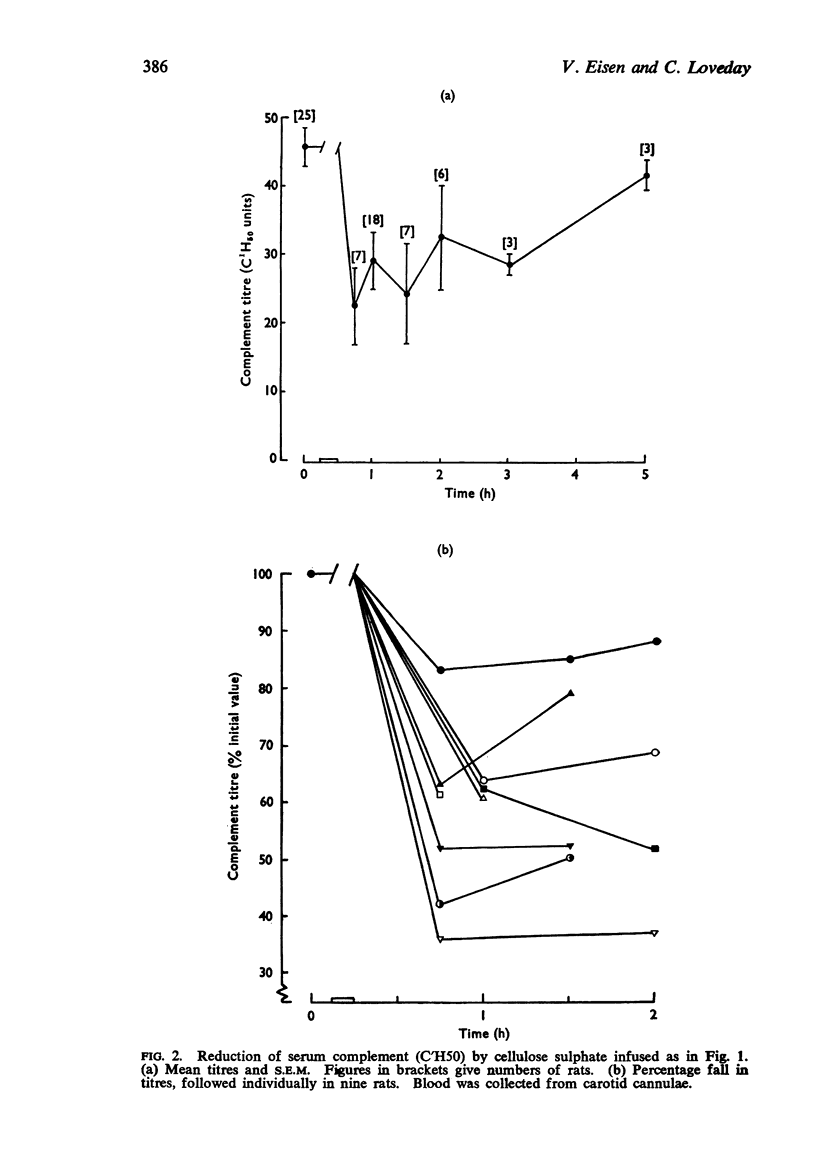
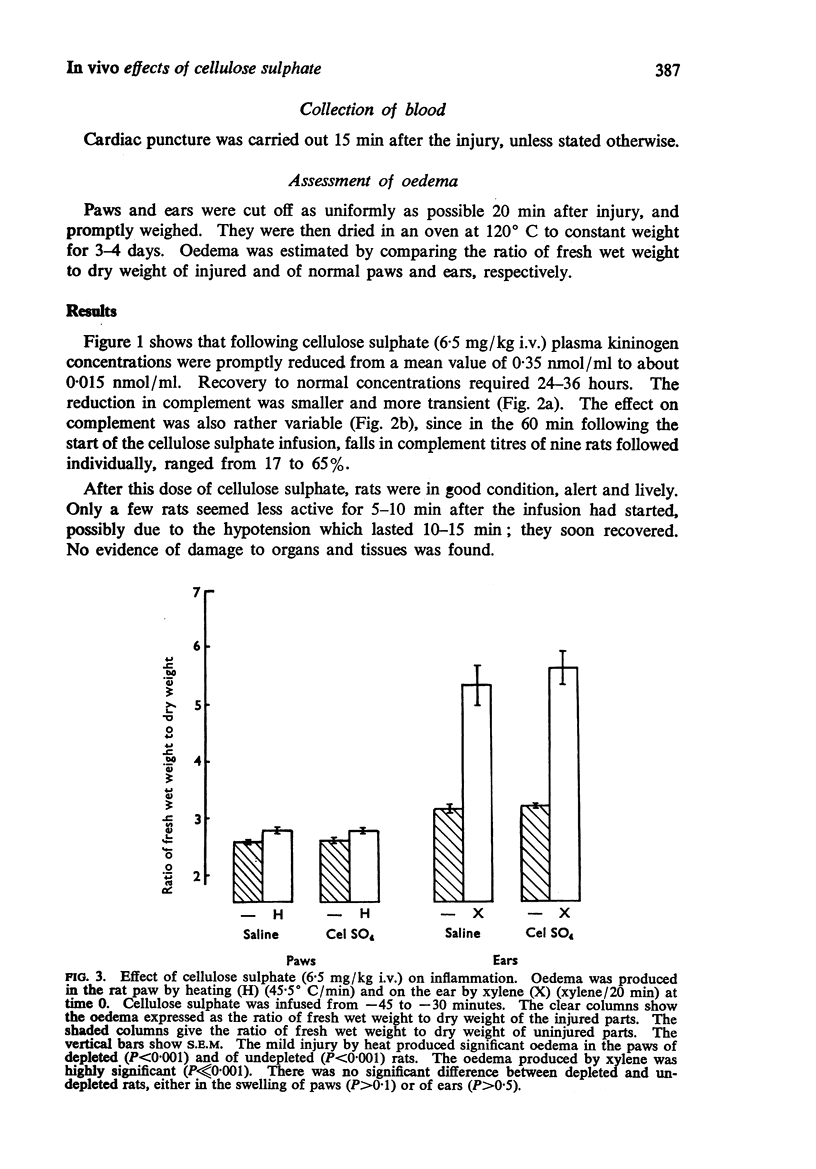
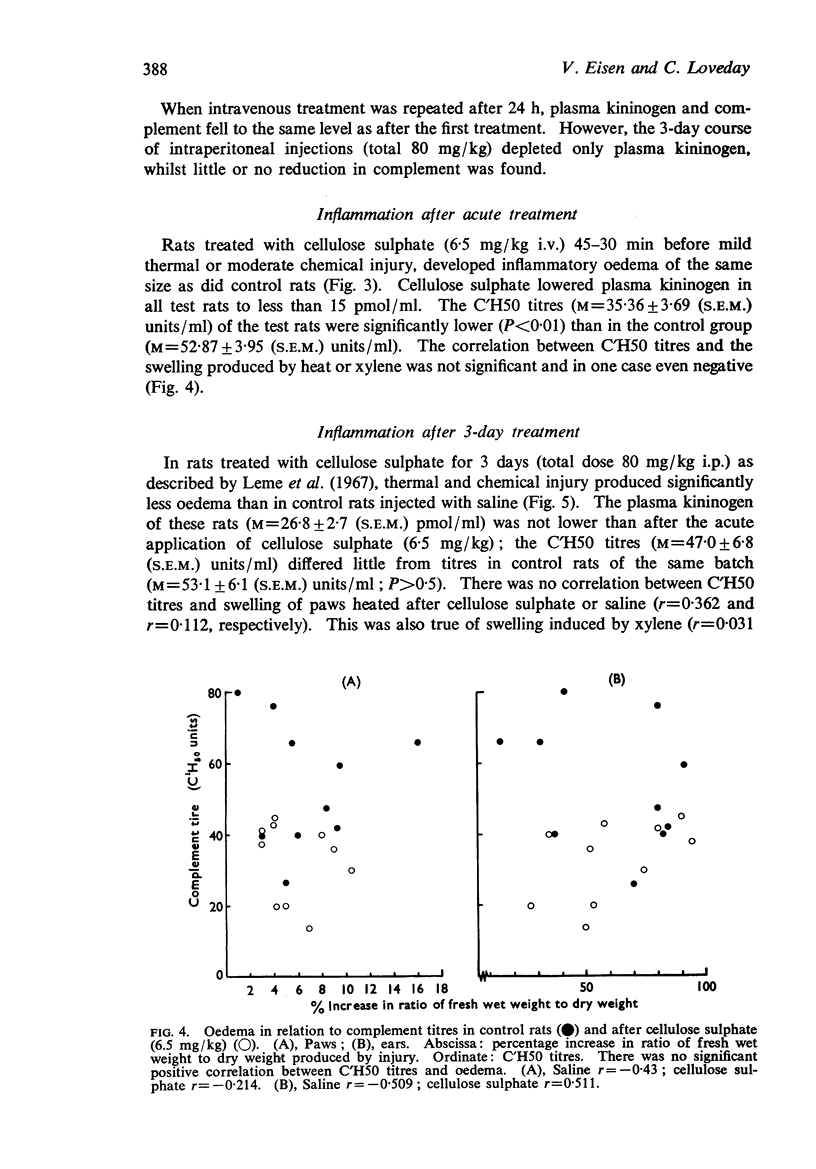
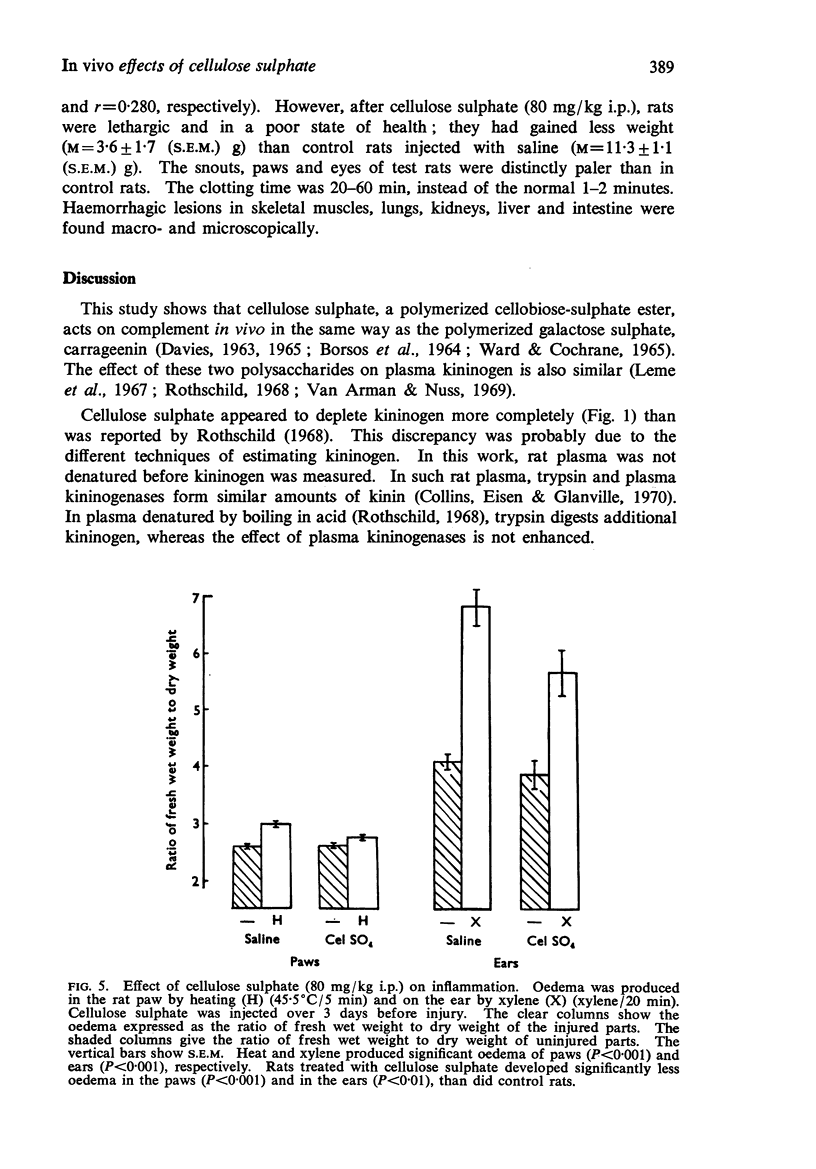
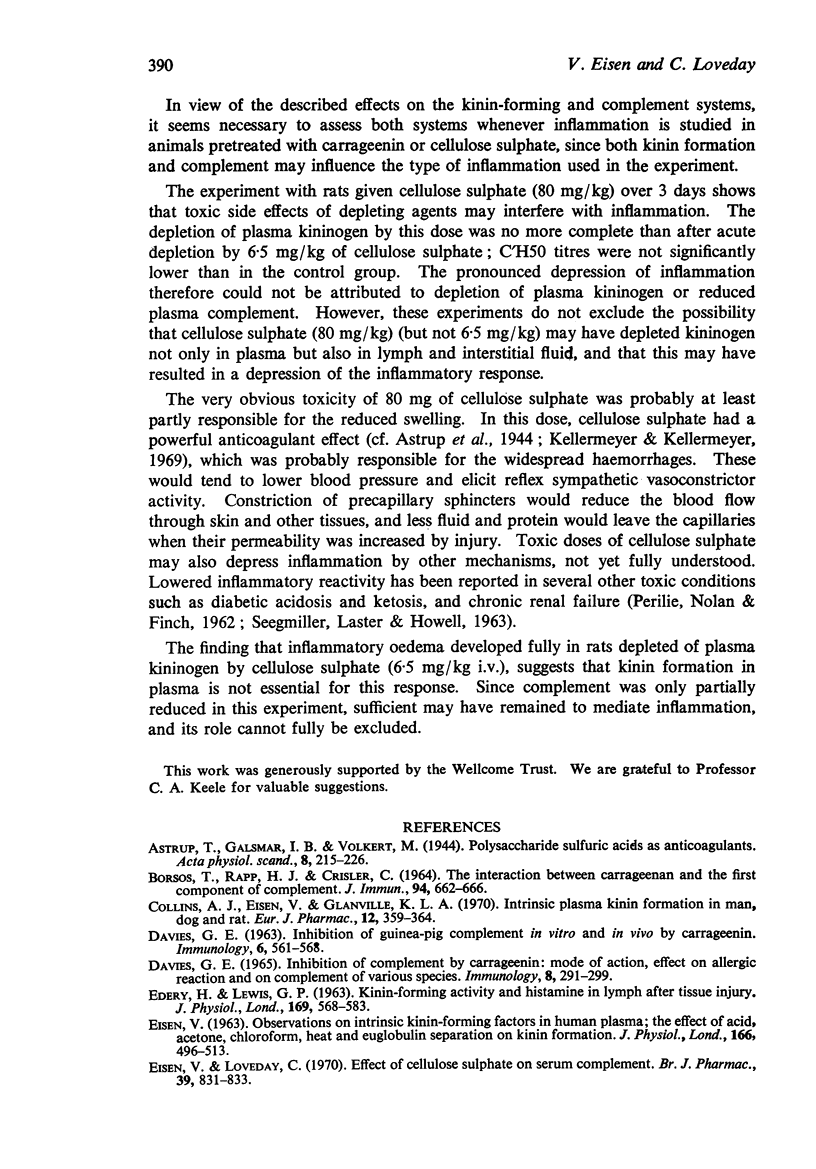
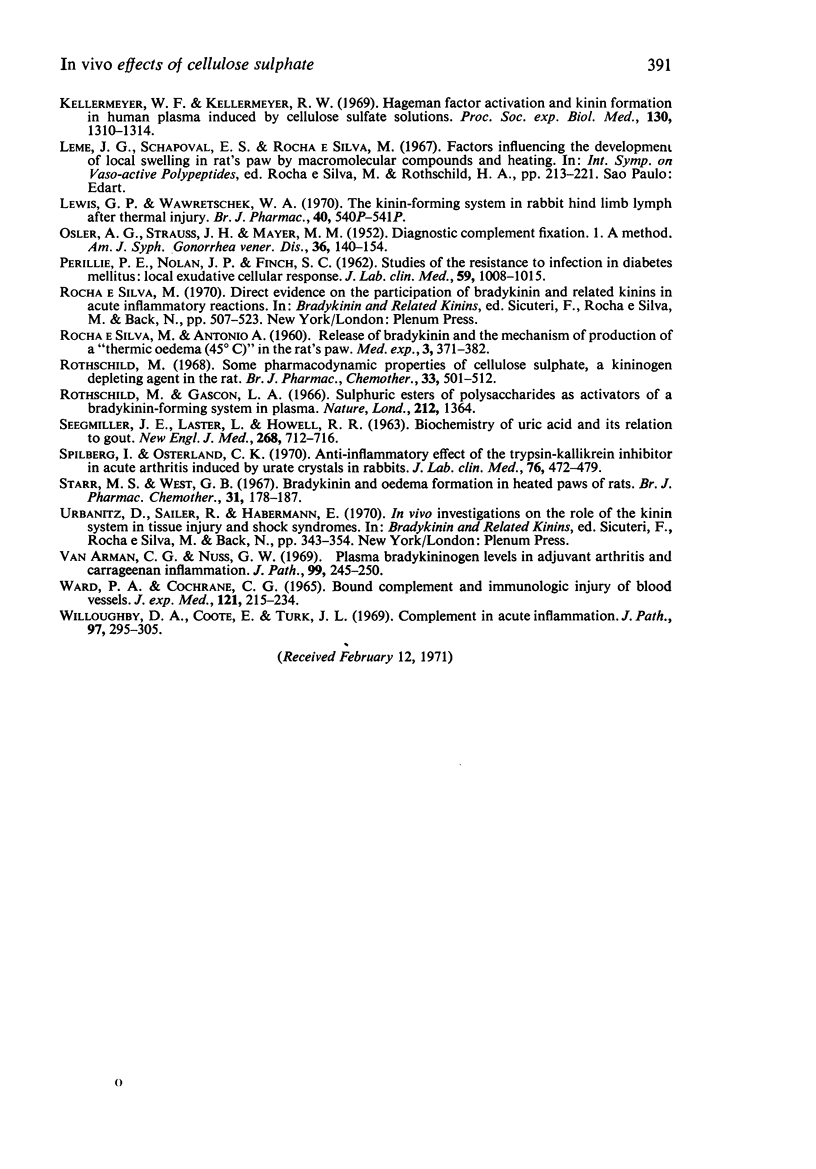
Selected References
These references are in PubMed. This may not be the complete list of references from this article.
- BORSOS T., RAPP H. J., CRISLER C. THE INTERACTION BETWEEN CARRAGEENAN AND THE FIRST COMPONENT OF COMPLEMENT. J Immunol. 1965 May;94:662–666. [PubMed] [Google Scholar]
- Collins A. J., Eisen V., Glanville K. L. Intrinsic plasma kinin formation in man, dog and rat. Eur J Pharmacol. 1970;12(3):359–364. doi: 10.1016/0014-2999(70)90088-9. [DOI] [PubMed] [Google Scholar]
- DAVIES G. E. INHIBITION OF COMPLEMENT BY CARRAGEENIN: MODE OF ACTION, EFFECT ON ALLERGIC REACTIONS AND ON COMPLEMENT OF VARIOUS SPECIES. Immunology. 1965 Mar;8:291–299. [PMC free article] [PubMed] [Google Scholar]
- DAVIES G. E. INHIBITION OF GUINEA-PIG COMPLEMENT IN VITRO AND IN VIVO BY CARRAGEENIN. Immunology. 1963 Nov;6:561–568. [PMC free article] [PubMed] [Google Scholar]
- EDERY H., LEWIS G. P. KININ-FORMING ACTIVITY AND HISTAMINE IN LYMPH AFTER TISSUE INJURY. J Physiol. 1963 Dec;169:568–583. doi: 10.1113/jphysiol.1963.sp007280. [DOI] [PMC free article] [PubMed] [Google Scholar]
- Eisen V., Loveday C. Effect of cellulose sulphate on serum complement. Br J Pharmacol. 1970 Aug;39(4):831–833. doi: 10.1111/j.1476-5381.1970.tb09910.x. [DOI] [PMC free article] [PubMed] [Google Scholar]
- Eisen V. Observations on intrinsic kinin-forming factors in human plasma: the effect of acid, acetone, chloroform, heat and euglobulin separation on kinin formation. J Physiol. 1963 May;166(3):496–513. doi: 10.1113/jphysiol.1963.sp007119. [DOI] [PMC free article] [PubMed] [Google Scholar]
- Kellermeyer W. F., Jr, Kellermeyer R. W. Hageman factor activation and kinin formation in human plasma induced by cellulose sulfate solutions. Proc Soc Exp Biol Med. 1969 Apr;130(4):1310–1314. doi: 10.3181/00379727-130-33780. [DOI] [PubMed] [Google Scholar]
- Lewis G. P., Wawretschek W. A. The kinin-forming system in rabbit hind limb lymph after thermal injury. Br J Pharmacol. 1970 Nov;40(3):540P–541P. [PMC free article] [PubMed] [Google Scholar]
- OSLER A. G., STRAUSS J. H., MAYER M. M. Diagnostic complement fixation. I. A method. Am J Syph Gonorrhea Vener Dis. 1952 Mar;36(2):140–153. [PubMed] [Google Scholar]
- PERILLIE P. E., NOLAN J. P., FINCH S. C. Studies of the resistance to infection in diabetes mellitus: local exudative cellular response. J Lab Clin Med. 1962 Jun;59:1008–1015. [PubMed] [Google Scholar]
- ROCHA E SILVA M., ANTONIO A. Release of bradykinin and the mechanism of production of a "thermic edema (45 degrees C)" in the rat's paw. Med Exp Int J Exp Med. 1960;3:371–382. [PubMed] [Google Scholar]
- Rothschild A. M., Gascon L. A. Sulphuric esters of polysaccharides as activators of a bradykinin-forming system in plasma. Nature. 1966 Dec 17;212(5068):1364–1364. doi: 10.1038/2121364a0. [DOI] [PubMed] [Google Scholar]
- Rothschild A. M. Some pharmacodynamic properties of cellulose sulphate, a kininogen-depleting agent in the rat. Br J Pharmacol Chemother. 1968 Jul;33(3):501–512. doi: 10.1111/j.1476-5381.1968.tb00498.x. [DOI] [PMC free article] [PubMed] [Google Scholar]
- SEEGMILLER J. E., LASTER L., HOWELL R. R. Biochemistry of uric acid and its relation to gout. N Engl J Med. 1963 Mar 28;268:712–contd. doi: 10.1056/NEJM196303282681306. [DOI] [PubMed] [Google Scholar]
- Spilberg I., Osterland C. K. Anti-inflammatory effect of the trypsin-kallikrein inhibitor in acute arthritis induced by urate crystals in rabbits. J Lab Clin Med. 1970 Sep;76(3):472–479. [PubMed] [Google Scholar]
- Starr M. S., West G. B. Bradykinin and oedema formation in heated paws of rats. Br J Pharmacol Chemother. 1967 Sep;31(1):178–187. doi: 10.1111/j.1476-5381.1967.tb01988.x. [DOI] [PMC free article] [PubMed] [Google Scholar]
- Van Arman C. G., Nuss G. W. Plasma bradykininogen levels in adjuvant arthritis and carrageenan inflammation. J Pathol. 1969 Nov;99(3):245–250. doi: 10.1002/path.1710990308. [DOI] [PubMed] [Google Scholar]
- WARD P. A., COCHRANE C. G. BOUND COMPLEMENT AND IMMUNOLOGIC INJURY OF BLOOD VESSELS. J Exp Med. 1965 Feb 1;121:215–234. doi: 10.1084/jem.121.2.215. [DOI] [PMC free article] [PubMed] [Google Scholar]
- Willoughby D. A., Coote E., Turk J. L. Complement in acute inflammation. J Pathol. 1969 Feb;97(2):295–305. doi: 10.1002/path.1710970215. [DOI] [PubMed] [Google Scholar]


